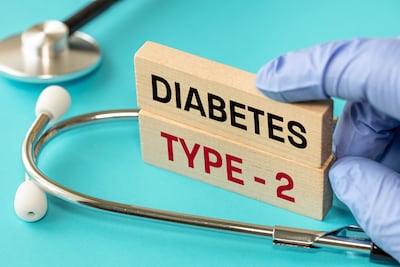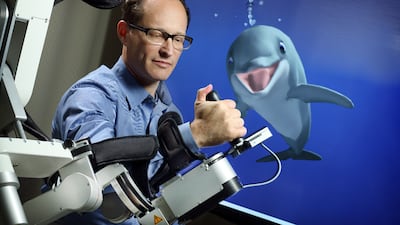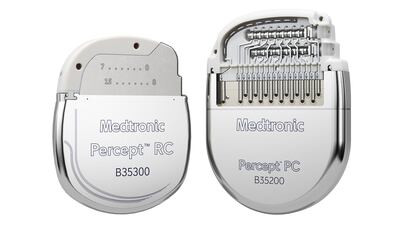Neurology
In this week’s Digital Health Roundup, Medtech Insight’s Ryan Nelson highlights Click Therapeutics’ FDA-cleared digital therapeutics (DTx) for depression and Sinaptica Therapeutics’ personalized neuromodulation for Alzheimer’s patients. Marion Webb discusses her interview with MindMaze’s John Krakauer on their gaming-focused DTx to help people recover from serious brain injuries. Elizabeth Orr introduces new voting members of the new Digital Health Advisory Committee and Natasha Barrow discusses Hello Heart’s new symptom-tracking feature in their heart-focused app.
This week, Establishment Labs Holdings announced the FDA gave it premarket approval for Motiva breast implant, Cologuard lands FDA approval for Cologuard Plus and GE HealthCare gets FDA nod for a new imaging agent. The FDA announces another expansion for TAP into ophthalmology and radiology. The AAMI and CTA will join forces to develop standards for AI and ML-enabled health care products.
Patrick Alexandre, Crossject CEO, discusses crucial developments happening for Zeneo, a needle-free injector, functioning intramuscularly to administer medication in a tenth of a second.
An additional $50m brings the neurovascular intervention specialist’s total Series F funding to $82m. Route 92 says it will use the capital to build its sales and support teams and pursue regulatory authorizations around the globe for its FreeClimb portfolio while advancing its SUMMIT MAX clinical trial for the investigational Monopoint Reperfusion System.
Tim Schmid, executive VP and worldwide chairman of J&J MedTech, expects Shockwave, acquired in April, and Abiomed, purchased in late 2022, to be “long-term gems” for the company. Cardiovascular is among higher-growth segments where J&J has concentrated investments in recent years, along with robotic surgical systems.
The US FDA has published a trio of draft guidance documents for its Assessment Scheme for Conformity Program, which began as a pilot in September 2020 to capitalize on the role of standards in the regulation of medical devices.
Click Therapeutics reports positive Phase 3 clinical data for CT-132, a digital therapeutic intended as an adjunctive treatment of episodic migraine. The company is pursuing FDA clearance and actively exploring opportunities to offer a drug-digital combination therapy with added clinical benefit that provides “a single, integrated experience for the patient, prescriber and payer.”
Inari Medical is updating use instructions for a clot-removing catheter due to the potential for serious adverse effects, including death.
The Acton, MA-based tubeless insulin pump specialist expands its indication for the Omnipod 5 AID system beyond type 1 diabetes as FDA authorization for type 2 comes sooner than Wall Street expected. Analysts expect clearances of rival systems from Tandem Diabetes Care and Medtronic in 2025, but believe Insulet is well-positioned to compete.
Two years after the EU adopted the original common specifications for certain products under the IVD Regulation, the commission has added new products and updated its requirements.
Caresyntax said it will use the $180m it recently raised in a series C extension and debt financing round to build out its vendor-neutral surgery platform aimed to help surgeons with real-time and long-term decision support to improve patient outcomes and efficiencies.
Hello Heart has introduced a symptom tracking feature in its app, allowing users to log feelings of dizziness or shortness of breath in conjunction with blood pressure readings. The enhancement will help all users to monitor cardiovascular risks, but women in particular could benefit, the company suggests.
The Seattle-WA-based company’s latest capital raise follows study results published in July in which Know Labs’ proprietary non-invasive RF dielectric sensor and machine learning algorithms correctly classified participants’ glycemic status as hyperglycemic, normoglycemic, or hypoglycemic with 93.37% accuracy compared with venous blood glucose values. Know Labs' goal is to commercialize a diabetes screening device that could help to funnel undiagnosed patients into the health care system.
Global investment firm Carlyle has agreed to pay $3.8b for Baxter International’s Kidney Care unit. The newly spun-off business will be known as Vantive.
MindMaze seeks to create a beautiful immersive experience for patients recovering from brain injuries. Chief medical director John Krakauer, clearly a “Star Wars” fan, discusses the significant need for digital therapeutics at a time when therapists are in short supply, as well as the challenges facing the DTx space as a whole.
Medtronic receives US FDA approval for deep brain stimulation surgery for people with Parkinson’s and essential tremors while the patient is under general anesthesia, making it the first and only company to offer DBS surgery while the patient is asleep.
This week, Medtronic recalled a nerve monitoring system due to reports of false responses. The US FDA approved the first auto-injector for opioid-overdose, made by Purdue Pharma. The agency granted de novo authorization for Labcorp’s PGDx elio plasma focus Dx used by labs for genetic profiling. As of 7 August, 950 AI/ML devices have been approved by the FDA. EKO Health teamed up with LSU to help detect arrhythmias and murmurs in student-athletes.
Unilabs and C2N Diagnostics signed a multi-year agreement that will expand access to C2N’s Alzheimer’s tests in Europe and other countries.
This week, the US FDA sent a warning letter to maker of batteries for AEDs, AMCO; Virtual Incision successfully completed the first hysterectomy its miniaturized robotic-assisted surgery device MIRA; The DOJ finalized a rule that requires government-operated health care facilities to provide accessible equipment for people with disabilities; the FDA compiled its resources on reprocessed medical devices onto a new web page; and more.
In this month’s Digital Health Roundup, Medtech Insight’s Marion Webb highlights AI discussions at the HLTH Europe conference and an interview with Motif Neurotech's CEO Jacob Robinson. Elizabeth Orr discusses DeepWell DTx's newly launched VR game for treating stress-related hypertension and anxiety. Natasha Barrow provides an overview of Digital Mental Health Technologies regulation in the UK and Brian Bossetta reports ‘the good and bad’ from Medtronic's report on digital technologies' use in the operating room.















